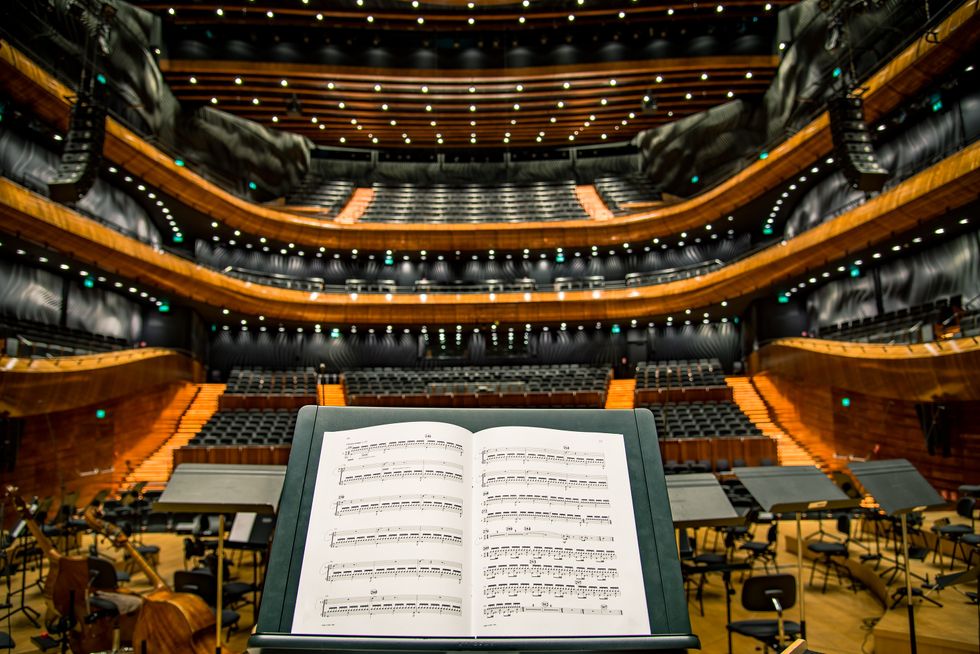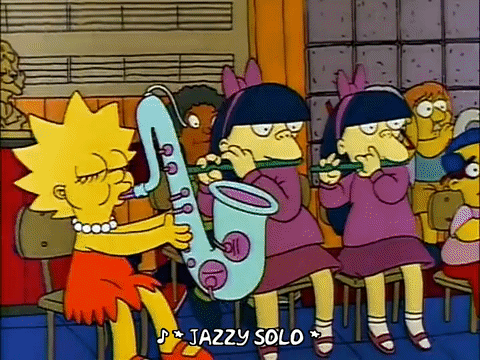Being a music major is nowhere near close to being an easy task. It's not just sitting in a chair and playing your instrument in a band, or singing in a choir. It's learning that different components that make up music and it's history. It is learning how to create and teach music. I can honestly say, being any sort of music major is not for everyone.
1) There are too many classes.
As previously stated, being a music major is not simple. When starting your college career, you need to be prepared to have a heavy work load every semester. Typically your first year or two is pretty simple; you have your core classes and then the course load starts to pick up.
Well, in the case of being in music, you are suffering from the get-go. Not only do you have to take your core classes such as Math and English, but you also have to take your music theory and aural skills class, one or two ensembles, techniques classes, education classes (only if you are a music education major, of course), conducting classes, and various other things in order to prepare you for a career in music.
Music education, performance, or composition are not 4 year degrees, much like most colleges advertise to you. Personally, I think you cram all of those into 4 years you aren't getting the full experience and you aren't retaining as much information because you are so stressed out.
2) You have plenty of dress clothes, but they are all black.
Picture this:
You are going out for a night on the town with your closest friends. You all decided to go out to a nice restaurant and you want to dress up. You go to open up your closet and the only dress clothes you own are solid black. However, your friends are all wearing vibrant colors. They are bright and exciting and you are dressed like you are going to a family member's funeral.
You can thank the person who came up with the idea that you should wear solid black during a concert setting. Who in the world thought it was a good idea to wear solid black clothes (and even worse, the men have to wear tuxedos) on a stage with stage lights shining brightly down on you, causing you to sweat like you've never sweat before.
Why can't we all just wear a brighter common color, like white? It still looks classy and it's not going to cause you to sit in a puddle of your own sweat for an hour and a half.
3) Chipped Reeds
As a clarinet player, I can say that there is NOTHING worse than chipping or just completely destroying your reeds on the day of the concert. Especially if you have a huge solo that night or even worse...it's your last good reed that you can use.
I know what you're thinking, "Oh it's just a piece of wood, you could stick reed up there and it would make the same noise." Well, you would be completely wrong. Not all reeds sound the same on your instrument (not even ones that are produced by the same company), and not all reeds work immediately like you want to. They especially aren't going to work they way you want if there's a huge chip in the side of it.
Oboes and bassoon players: unless you have an emergency back-up reed, you are basically screwed and your life is pretty much over once you've chipped it.
4) Practicing: When and How
There is nothing that scares some musicians more than the dreaded P-word: practicing.
It's what makes you a better musician and helps you perform better in ensembles and in your end-of-the-semester juries. However, a lot of musicians just don't enjoy practicing. You lock yourself in a tiny room with your instrument and you practice whatever you've been struggling with in your lessons or ensembles. You repeat sections of pieces over and over again at slow tempos just so you can get them right. While it may seem tedious, it is quite beneficial when done correctly.
Part of the reason why I think that people find practicing so stressful is that that aren't practicing efficiently. If you practice the same section over and over again without making any sort of changes to how you are doing it, you will eventually get aggravated and even more stressed out. For example, if there is a really difficult sixteenth note passage in your piece and you don't slow the tempo down or take certain groups of them at a time, you are likely to get frustrated. Trust me, I've been there numerous times and it is not fun.
5) You want to go out with your friends, but you have a concert or rehearsal every single day this week.
This is probably the number one problem that every music major will face and that is finding the time to go out and do something exciting. Not saying that performing isn't exciting but sometimes you just need to take some times for yourself or to hang out with your friends outside of a academic or performance setting. But there's almost always something that gets in the way of that.
Maybe you have a concert that night, a late night sectional, homework for the 10 or more classes that you have, or sometimes you even a late evening class because you can't fit it anywhere in your schedule. Or even worse, you don't have anything to do that evening but you are so tired from everything else that you have had to do that going out and being away from your comfort of your bed is basically a death wish.
6) Technique and Methods classes (sorry education majors!)
In order to teach a student a subject, you must first know pretty much everything about it. That's common knowledge and music education is no different. You must learn the basics about each instrument, whether you play it regularly or not, and how to teach them to your beginning band students. If you don't know how to teach a certain instrument, how do you expect your students to understand? You almost must learn how to teach a band, orchestra, or choir. Whenever I first started college, I thought that once I learned how to teach one that I could teach them all. Boy was I completely wrong!
One important thing to keep in mind is that you might be an amazing musician but that doesn't necessarily mean that you can teach it. Demonstrating your skill is one thing but actually taking that skill and instilling it in the minds of students is what being an educator is all about.
7) Going days without seeing your non-music major friends
As my high school friends and I graduated, we all went into our separate majors. I went into music and they went into the English or medical field. I thought we were going to be able to see each other all the time. Unfortunately, I was mistaken.
My weekdays consist of classes from 8 in the morning until at least 3 in the afternoon, and then at 4:30 I go to work and I'm stuck there until midnight. Not to mention that I had games once or twice a week both semesters for marching band and pep band.
On average, a typical music major has at least one evening to "rest", which actually translates to "worrying about what I need to practice or what homework assignments I have due that week. This type of schedule makes it nearly impossible to hang out with friends unless they are also music majors.
Luckily, I have such a wonderful group of friends back home that are still there for me no matter what, even if I can't see them as often as I want them too.
8) Performance Anxiety
Performance anxiety: a musician's worst enemy. Nothing is worse than spending weeks and weeks preparing for a performance and then going out there and messing up because you are so nervous.
Even the best musicians can get nervous. It's the thought of going out in front of an audience and messing up really bad and not being able to recover from it. Performance anxiety can get the best of every musician.
Everyone has their own ways of feeling/showing anxiety before a performance.
For example: some people sweat.
Some people shake uncontrollably.
Some people feel like their heart is going to pound out of their chest.
No matter what you do whenever you are nervous, every music major can agree that having performance anxiety is the worst.
9) Juries
Whenever you start taking lessons in college, you may assume that you just go once and a week and your applied teacher just helps you out with the technical aspects of your instrument and then that's the end of it. And then they dropped the bomb on you about your end-of-the-semesters juries.
A jury is basically your "final exam" for your lessons. You perform for your applied professor and a few other faculty members (it may be different at every university) whatever piece(s) you have been working on that semester. Usually you are accompanied by a pianist, unless you are a percussionist.
This is where the importance of practicing really comes into play. If you don't practice for your jury, you will not move forward in your lessons or in your major. Especially if you decided not to practice the semester of your sophomore hearing. A sophomore hearing typically happens the second semester of your sophomore year and is used to evaluate how well you are progressing in your playing ability. If you go in there and play awful, you will be behind and may even be asked to consider changing your major.
10) Being Respected
Being in the music field, you risk constantly being disrespected by everyone around you. These are people who just don't understand the importance of music in the classroom or even in the world. Music education and performance are seen as pointless. There have been numerous occasions on the internet that I have seen the statement "What can you do with a music degree? Spend the rest of your life in poverty probably."
While teachers usually don't make a whole lot of money, that doesn't make them any less important no matter what subject they teach. Whether it be music, art, English, math, history, physical education, etc., every teacher is important. Without music education, how do you think the music you listen to on a daily basis would exist? If your favorite artists didn't have a band or choir to be in during middle and high school, do you think they would've still tried to become famous? Music teachers are some of the most inspirational teachers that I have since I started school. I wouldn't be where I am today if it weren't for my band director.
Although being a music major might be the most stressful 4-6 years of your life, it is so rewarding. Making and teaching music has brought forth so many opportunities in my life that I honestly wouldn't trade it for anything in the world. Looking past all of the stress and mental breakdowns, completing this degree is completely worth it.






























